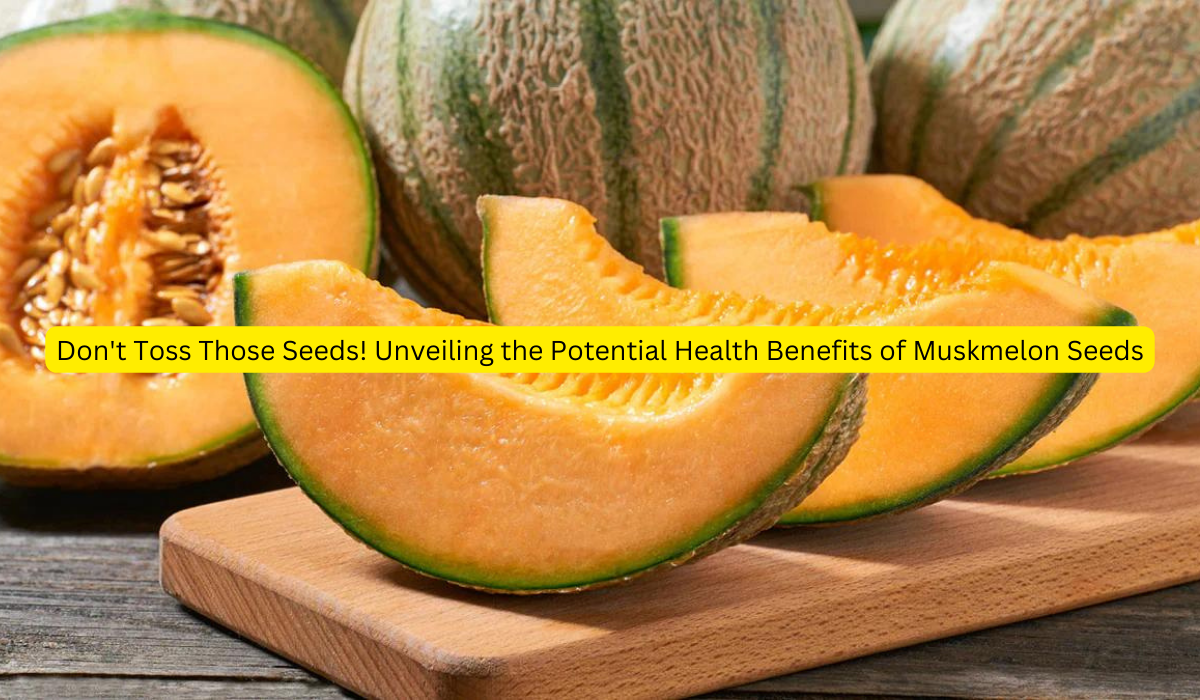Picture this: you’ve enjoyed a refreshing slice of juicy muskmelon, a summertime favorite. But what about those tiny, white seeds you meticulously scooped out? Believe it or not, those seemingly insignificant seeds might be a treasure trove of hidden health benefits! So, next time you reach for that spoon, consider keeping those seeds – they might just surprise you.
Beyond Refreshment: Unveiling the Nutritional Powerhouse of Muskmelon
Muskmelon, also known as cantaloupe, is a delicious and hydrating fruit. But its benefits extend beyond its refreshing taste. Muskmelon boasts a range of vitamins and minerals, including:
- Vitamin A: Crucial for healthy vision and immunity.
- Vitamin C: An antioxidant that helps fight off free radical damage and promotes overall well-being.
- Potassium: An essential mineral for maintaining healthy blood pressure and muscle function.
Think of muskmelon as a juicy treasure chest overflowing with essential nutrients.
The Mighty Mini: Unveiling the Power of Muskmelon Seeds
Those tiny muskmelon seeds might be small, but they pack a powerful nutritional punch. Here’s a glimpse into what they offer:
- Healthy Fats: Muskmelon seeds are a good source of omega-3 and omega-6 fatty acids, essential for heart health and cognitive function. Imagine them as tiny building blocks for a healthy brain and heart.
- Fiber Powerhouse: These little seeds are surprisingly rich in dietary fiber, which aids digestion, promotes gut health, and keeps you feeling fuller for longer.
- Protein Power: While not a complete protein source, muskmelon seeds contribute a small amount of protein to your diet, supporting muscle health and cell repair.
Don’t underestimate the power of these tiny seeds – they’re nutritional champions in disguise!
A Seed of Health: Exploring the Potential Benefits of Muskmelon Seeds
While more research is needed to solidify all the claims, here are some potential benefits associated with consuming muskmelon seeds:
- Improved Heart Health: The healthy fats and antioxidants in muskmelon seeds might contribute to a healthy heart by potentially lowering bad cholesterol levels and reducing inflammation.
- Aiding Digestion: The fiber content in muskmelon seeds can promote regularity and overall digestive health.
- Blood Sugar Management: Some studies suggest muskmelon seeds might help regulate blood sugar levels, potentially benefiting those managing diabetes (consult your doctor for personalized dietary advice).
Remember: Muskmelon seeds shouldn’t be seen as a magic bullet for any health condition. They’re best enjoyed as part of a balanced diet and healthy lifestyle.
Deliciously Diverse: How to Enjoy Muskmelon Seeds
So, you’re convinced about the potential benefits of muskmelon seeds, but how do you incorporate them into your diet? Here are some creative ideas:
- Roasted Delight: Roast the seeds like pumpkin seeds for a crunchy and flavorful snack. Season them with your favorite spices like chili powder, cumin, or garlic powder for an extra kick.
- Salad Powerhouse: Sprinkle raw or roasted seeds on top of your salads for a boost of nutrients and a delightful textural contrast.
- Smoothie Surprise: Add a teaspoon of ground muskmelon seeds to your morning smoothie for a hidden dose of healthy fats and fiber.
The possibilities are endless! Experiment and discover your favorite ways to enjoy the benefits of muskmelon seeds.
A Seed of Change: Embrace the Power of Muskmelon Seeds
Next time you indulge in a juicy muskmelon, consider keeping those seeds. Packed with healthy fats, fiber, and protein, they offer a range of potential health benefits. From potentially aiding digestion to contributing to heart health, these tiny seeds are a valuable addition to your diet. So, embrace the power of muskmelon seeds and explore the delicious ways to incorporate them into your meals!
Frequently Asked Questions
1. Do muskmelon seeds taste good?
Muskmelon seeds have a mild, slightly nutty flavor. When roasted or seasoned, they become quite delicious.
2. Are there any side effects to consuming muskmelon seeds?
Muskmelon seeds are generally safe for most people in moderation. However, some individuals with sensitive digestive systems might experience mild bloating or gas. Start with a small amount and increase gradually to allow your body to adjust.
3. Can I eat the muskmelon skin?
Muskmelon skin is safe to eat, but it can be tough and unpleasant for some. If you decide to try it, peel off the outer green layer and enjoy the fleshy white part.
4. How long can I store muskmelon seeds?
Once separated from the flesh, dry the muskmelon seeds completely in a single layer on a paper towel in a cool, dry place with good air circulation. Store them in an airtight container in a cool, dark pantry for up to 6 months.
5. Can I sprout muskmelon seeds?
Yes, you can! Muskmelon seeds can be sprouted for a microgreen addition to your salads or sandwiches. Research the proper sprouting techniques for optimal results. However, sprouted muskmelon seeds might not offer the same nutritional profile as dried or roasted seeds.

